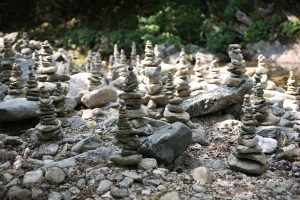This time, Inamori* spoke about the above motto in Kyocera philosophy.
What Inamori said is quoted with “”.
“It is important to have big dreams and aspirations. However, even if we set great goals, we still must do things that at first glance seem simple and boring in our daily work. Therefore, sometimes you may feel that there is a big gap between your dreams and reality, and you may end up getting overwhelmed. However, no matter what field you work in, before you achieve your goals, you will have to make steady efforts to keep improving, conduct basic experiments, collect data, and use your skills to get purchase orders.
It looks like piling up small pebbles to make a tower. We must never forget that great things cannot be achieved in a short term, but only through the accumulation of humble and continuous efforts.”
The reasons why Mr. Inamori had stressed this motto of making steady efforts are as follows:
1 To achieve the long-term goal in the shortest way
2 To accumulate technologies and know-how.
3 To incorporate objective views and opinions
Let me explain one by one.
1 To achieve the long-term goal in the shortest way
“`It’s just like piling up pebbles at the river bank. (In Buddhism, this implies the never-ending works) It’s a series of simple tasks, stacking one stone and then another. However, as you repeat this, your subordinates and colleagues will gather around you. Have those people load them one by one, and have their subordinates load them as well.
Then, as the company grows, the number of associates will gradually increase, and even if each person carries only one stone at a time, the company will become one where 100 or 1,000 people are working together and bringing their outputs at the same time.
Obviously, one person can do only a limited amount of work, but when many people work together and continue to do so, great things can eventually be accomplished. That’s what I realized. ”
→ The real estate appraisal work that we do involves a lot of detailed work and tasks, and we sometimes end up doing the same thing over and over again. However, it is true this kind of system has enabled us to create Japan’s wonderful infrastructure.
I believe appraisal works are fundamental to Japan’s wonderful society, such as railways, roads, expressways, station complex developments, and urban city town planning. We have continued to do these simple tasks since before the war. We must be aware that our steady works and endeavors have created the foundation of our society.

2 To accumulate technologies and know-how.
” Speaking of ingenuity, it may sound difficult, but it means the attitude of making a tiny and small improvement from what we did yesterday. Even when it comes to stacking the same stones, there are various ways to stack them, such as using carts to carry the stones, and having multiple people carry and stack them in relay style. ‘Let’s try this approach today and tomorrow, we shall try a different approach from what we do today.’
I have continued to do this steadily. If you work creatively and ingeniously, even if the work is simple and unremarkable, you will gradually improve from yesterday to today, and you can enjoy working. As a result, this is not just a way to avoid getting bored at work, but will eventually lead to a big leap forward. ”
→ When I talked about this Japanese ingenuity to people from overseas, they were very surprised. Especially in Europe and America, people who work as cleaning staff always do it reluctantly, as if it’s boring. This is because they have a different way of thinking about work.
When Japanese people clean, they use their energy to think about how to deliver the perfect output, how to use our physical bodies, and how to create a comfortable space. In Japan, there are many ways to clean and get our living spaces organized, as shown in the Youtube videos, all of them are wonderfully creative. I would like to start by trying out some ingenuity and ingenuity, starting with simple and daily tasks such as cleaning.

3 To incorporate objective views and opinions
“ When you challenge something new, you may get stuck and look for a solution. While seeking it, you may ask some experts in other business areas and be able to get brilliant advice from them. With those hints, in your workplace, you will try that idea, get results, make some arrangements, see the result, analyze the deficit, and make improvements.
Through those workflows, you can develop some technologies and accumulate so-called know-how. By piling up those improvements, you would be able to be an outstanding company in your work field. In other words, not the knowledge you learned from school, but experiences allow you to be an expert. ”
→ Nowadays, asking any questions on the internet has been a sort of trend, and few people ask others for any advice. However, it is still so important to have direct communication with others to have advice.
For instance, Tetsu Nakamura, who voluntarily worked and developed the irrigation system in Afghanistan, got a hint of how to create weirs from the illustration stored in the library of his hometown. We must humbly ask others’ opinions and incorporate them into our works. This motto teaches us how to seek the solutions without the internet.

So, to summarize, repeated ingenuity and simple efforts will create the company’s technology and know-how, help all staff members acquire a humble attitude, and become the foundation for achieving great things. “Don’t forget this motto”. I would like to always tell this to myself.
* Mr. Kazuo Inamori, the founder of Kyocera, KDDI (one of the top tele communication companies in Japan) and the top of revitalization project of JAL. As a well-known Japanese entrepreneur, he has been sharing his experiences and management know-how with managements of small to middle companies in Japan.
Further queries or doubts, please email to ytomizuka@abrilsjp.com
News Letter subscription is here











